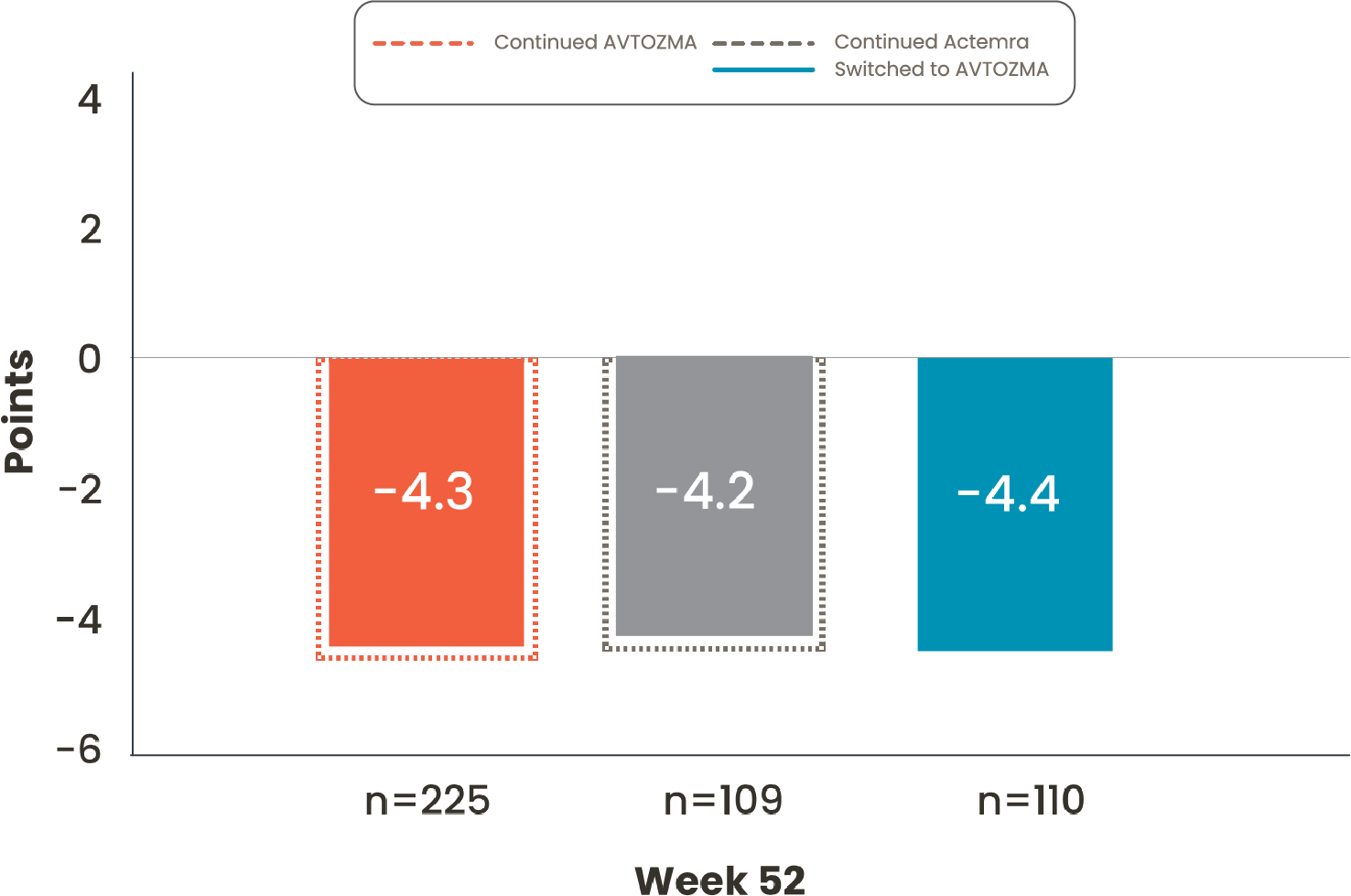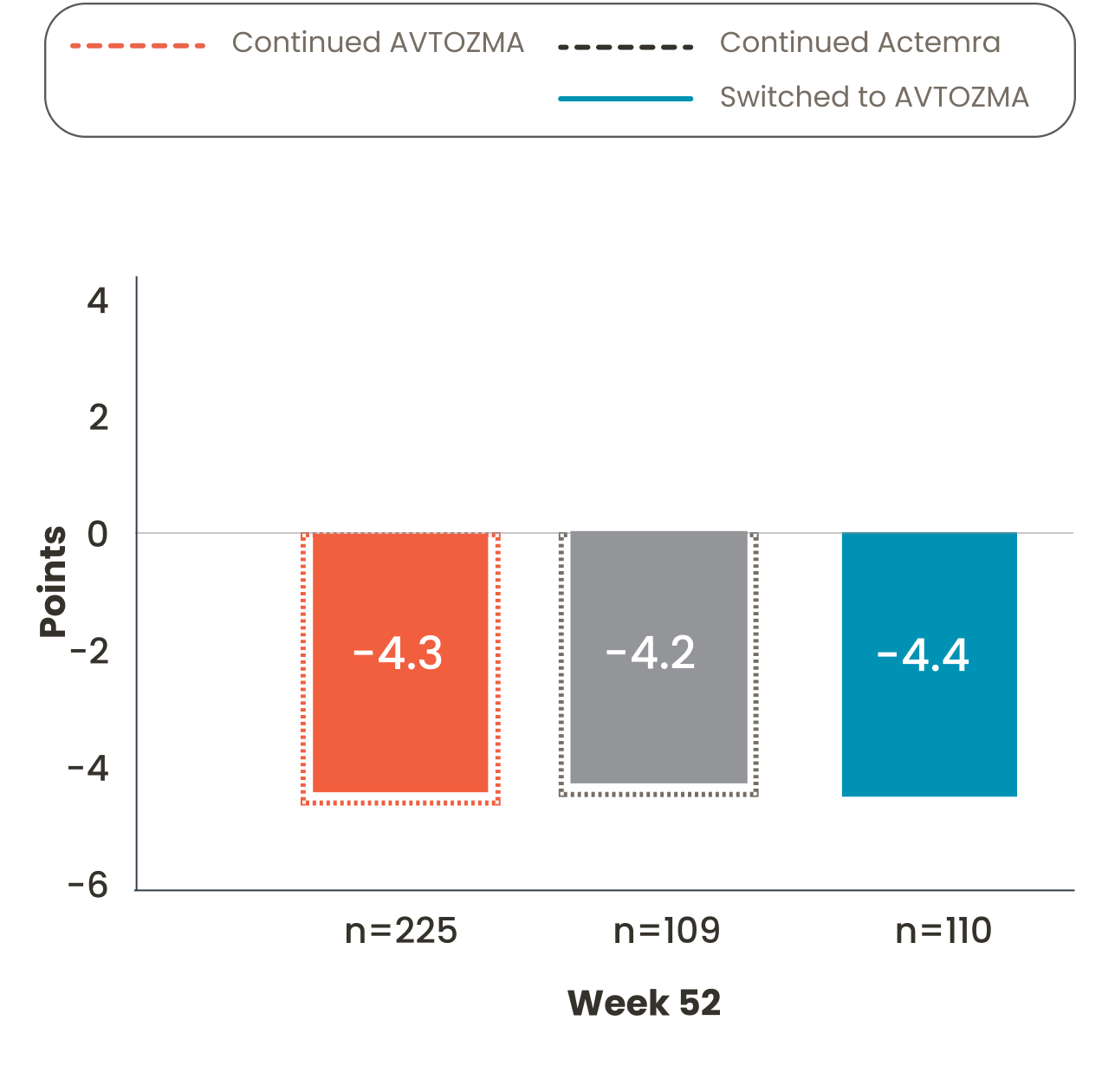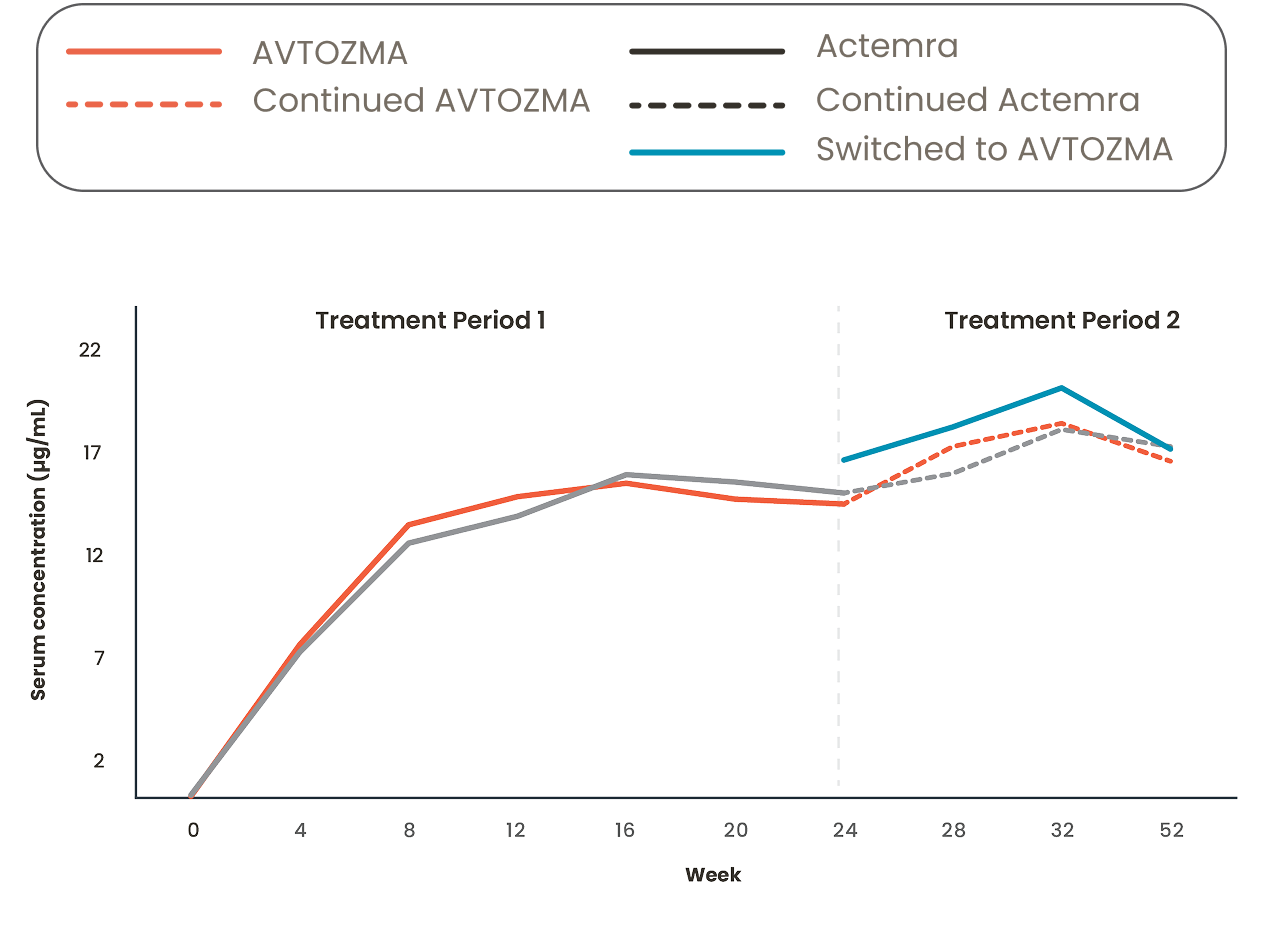IMPORTANT SAFETY INFORMATION
WARNING: RISK OF SERIOUS INFECTIONS
Patients treated with tocilizumab products including AVTOZMA are at increased risk for developing
serious infections that may lead to hospitalization or death. Most patients who developed these
infections were taking concomitant immunosuppressants such as methotrexate or corticosteroids.
If a serious infection develops, interrupt AVTOZMA until the infection is controlled. Reported
infections include:
-
Active tuberculosis, which may present with pulmonary or extrapulmonary disease. Patients, except
those with COVID-19, should be tested for latent tuberculosis before AVTOZMA use and during therapy.
Treatment for latent infection should be initiated prior to AVTOZMA use.
-
Invasive fungal infections, including candidiasis, aspergillosis, and pneumocystis. Patients with
invasive fungal infections may present with disseminated, rather than localized, disease.
- Bacterial, viral and other infections due to opportunistic pathogens.
The risks and benefits of treatment with AVTOZMA should be carefully considered prior to initiating
therapy in patients with chronic or recurrent infection.
Patients should be closely monitored for the development of signs and symptoms of infection during and
after treatment with AVTOZMA, including the possible development of tuberculosis in patients who tested
negative for latent tuberculosis infection prior to initiating therapy.
Contraindications: Known hypersensitivity to tocilizumab products.
Serious Infections. Serious and sometimes fatal infections, including
bacterial, mycobacterial, invasive fungal, viral, and opportunistic infections, have been reported with
tocilizumab products, including AVTOZMA. Common serious infections include pneumonia, urinary tract
infections, cellulitis, herpes zoster, and sepsis, while opportunistic infections such as tuberculosis and
cryptococcus have also occurred. Patients with chronic or recurrent infections, tuberculosis exposure, or
underlying conditions predisposing to infections should have the risks and benefits of AVTOZMA carefully
evaluated. Monitor patients closely during and after treatment for signs of infection, and discontinue AVTOZMA
if a serious infection develops, initiating appropriate antimicrobial therapy as needed.
Gastrointestinal (GI) Perforation. Gastrointestinal perforation events,
primarily associated with diverticulitis, have been reported in clinical trials of tocilizumab. Use AVTOZMA
cautiously in patients at increased risk for gastrointestinal perforation. Promptly evaluate any patient
experiencing new abdominal symptoms to ensure early detection and management of this condition.
Hepatotoxicity. Serious hepatic injury, including cases of liver transplant
and death, has occurred with tocilizumab products, with onset ranging from months to years. Some cases
involved marked transaminase elevations (>5x ULN), while others presented with mild elevations and symptoms of
liver dysfunction. Risk is higher with hepatotoxic drugs like methotrexate. Baseline and regular liver tests
are required for RA, GCA, PJIA, and SJIA patients, with specific monitoring intervals based on the condition.
Do not initiate AVTOZMA if ALT or AST >1.5x ULN (RA/GCA) or >10x ULN (COVID-19), and discontinue if ALT or AST
>5x ULN. Evaluate symptoms of liver injury promptly, and only restart treatment if liver test abnormalities
are resolved and attributed to another cause.
Changes in Laboratory Parameters. Treatment with tocilizumab products,
including AVTOZMA, has been associated with neutropenia, thrombocytopenia, elevated liver enzymes, and lipid
abnormalities. Infections are uncommon with treatment-related neutropenia, but AVTOZMA should not be initiated
in RA or GCA patients with ANC <2000/mm³ or platelet counts <100,000/mm³, and treatment is not recommended if
ANC drops below 500/mm³ or platelets below 50,000/mm³. For COVID-19 patients, AVTOZMA is not recommended with
ANC <1000/mm³ or platelets <50,000/mm³. Monitor neutrophils, platelets, and liver enzymes 4-8 weeks after
starting therapy and every 3 months thereafter, adjusting treatment as needed. Lipid levels, including
cholesterol and triglycerides, may increase and should be assessed 4-8 weeks after initiation, with management
per clinical guidelines. A similar pattern is observed in PJIA and SJIA, requiring specific monitoring
intervals for these populations. Refer to Dosage and Administration for modifications based on test results.
Immunosuppression. The effect of tocilizumab products on malignancy
development is unknown, though malignancies were observed in clinical studies. As an immunosuppressant,
AVTOZMA may increase the risk of malignancies.
Hypersensitivity Reactions, Including Anaphylaxis. Hypersensitivity reactions,
including anaphylaxis and fatal events, have been reported with tocilizumab products. Anaphylaxis requiring
discontinuation occurred in 0.1% to 0.7% of trial patients, with postmarketing cases reported at various
doses, with or without premedication, and as early as the first infusion. AVTOZMA intravenous infusions must
be administered by healthcare professionals equipped to manage anaphylaxis. For subcutaneous use, patients
must seek immediate medical attention if hypersensitivity symptoms occur. Discontinue AVTOZMA permanently if
anaphylaxis or other hypersensitivity reaction occurs. Do not use in patients with known hypersensitivity to
tocilizumab products.
Demyelinating Disorders. The impact of tocilizumab on demyelinating disorders
is unknown, but rare cases like multiple sclerosis and polyneuropathy were reported in RA studies. Monitor for
symptoms and use caution in patients with preexisting or recent demyelinating disorders.
Active Hepatic Disease and Hepatic Impairment. Treatment with AVTOZMA is not
recommended.
Live Vaccines. Avoid concurrent use of live vaccines with AVTOZMA, as clinical
safety and secondary transmission risk are unknown. Follow guidelines on timing between live vaccines and
AVTOZMA.
Adverse Reactions reported in ≥5% of tocilizumab-treated patients include
upper respiratory tract infections, nasopharyngitis, headache, hypertension, increased ALT, and injection site
reactions.
Please see full Prescribing Information, including BOXED WARNING.


